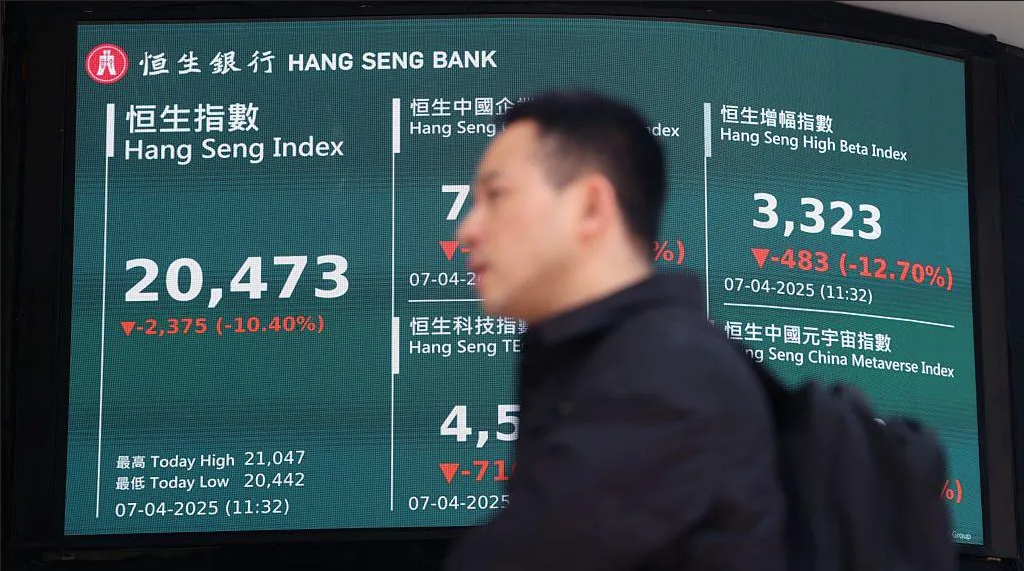Asian stock markets have plummeted as the shockwaves from US President Donald Trump’s tariffs continue to reverberate around the world.
Major indexes from Shanghai to Tokyo and Sydney to Hong Kong plunged on Monday. “It’s a bloodbath,” one analyst told the BBC.
As a region that manufactures so many of the goods sold globally, Asian countries and territories are being hit directly by the tariffs.
They are also particularly sensitive to the impact of fears that a global trade war could trigger a slowdown or even a recession in the world’s biggest economy.
Japan’s Nikkei 225 benchmark index closed down by 7.8%, the ASX 200 in Australia lost 4.2% and the Kospi in South Korea ended 5.6% lower.
Slumps in mainland China, Hong Kong and Taiwan were exacerbated as investors caught up with the big falls seen in other markets on Friday as they were closed for public holidays.
The Shanghai Composite closed 7.3% lower and Taiwan Weighted Index lost 9.7%.
The Hang Seng was down by 12.5% in afternoon trading.
“Tariffs are feeding into expectations around inflation and a recession,” said Julia Lee, head of client coverage at FTSE Russell, a subsidiary of the London Stock Exchange Group.
Goldman Sachs now forecasts there is a 45% chance the US will fall into recession in the next 12 months – up from a previous estimate of 35% – as the investment banking giant lowered its economic growth forecast for the country.
Other Wall Street firms have also revised their recession forecasts in the wake of Trump’s tariff announcement. JPMorgan now sees a 60% chance of a US and global economic downturn.
A significant slowdown in the US economy would have major repercussions for Asian exports as the US is such an important market for goods from the region.
“Asia is bearing the brunt of the US tariff hike. While there could be some room for negotiation, a new regime of higher tariffs are here to stay,” Qian Wang, Asia Pacific chief economist at investment firm Vanguard.
“This is negative to the global and Asia economy, especially those small open economies, both in the short term and long term.”
Countries from Vietnam to Bangladesh have become highly-reliant on the US as an export market.
Trump’s announcement last week included a 46% tariff on Vietnam and 37% on Bangladesh.
Several major US brands produce goods in Vietnam, including Nike and Lululemon.
Bangladesh exports $8.4bn (£6.5bn) of garments a year to the US, according to trade body the Bangladesh Garment Manufacturers and Exporters Association.
“Asia is likely to feel a disproportionate brunt of this turmoil because Asia sends more exports to the US than to other markets,” said Frank Lavin, former undersecretary for international trade at the US Department of Commerce.
On Friday, the global stock market turmoil deepened, after China hit back at tariffs announced by Trump.
All three major US stock indexes in fell by more than 5%, with the S&P 500 dropping almost 6%, capping the worst week for the US stock market since 2020.
In the UK, the FTSE 100 plunged almost 5% – its steepest fall in five years, while exchanges in Germany and France faced similar declines.
Ms Lee also highlighted that the global stock market rout looks set to continue: “US futures trading lower point to another hard session on Wall Street tonight.”
Global stock markets have lost trillions in value since Trump announced sweeping new 10% import taxes on goods from every country, with products from dozens of countries, including key trading partners such as China, the European Union and Vietnam, facing far higher rates. – BBC
Additional reporting by Annabelle Liang
Stay informed with The Namibian – your source for credible journalism. Get in-depth reporting and opinions for
only N$85 a month. Invest in journalism, invest in democracy –
Subscribe Now!










